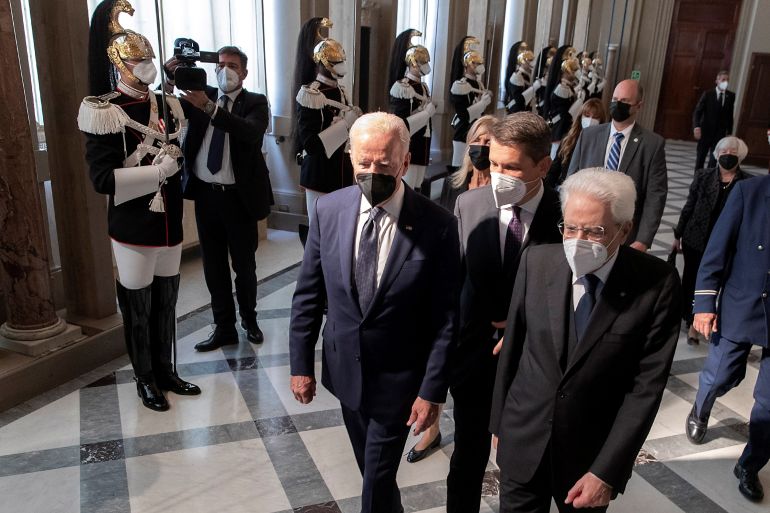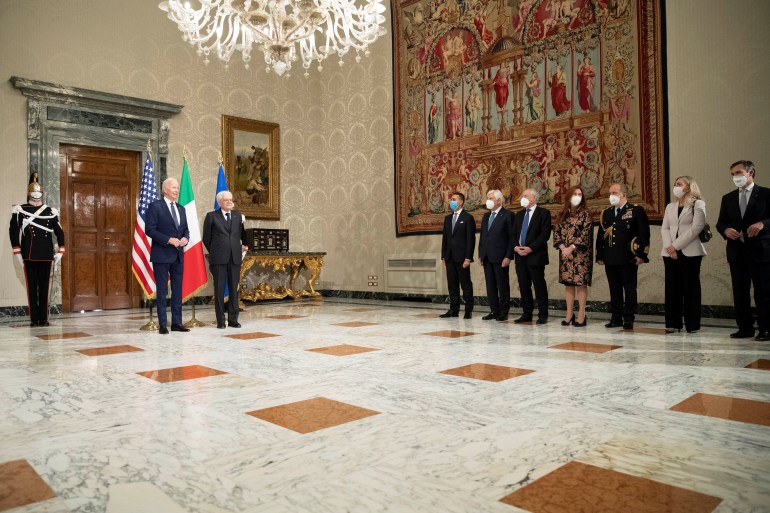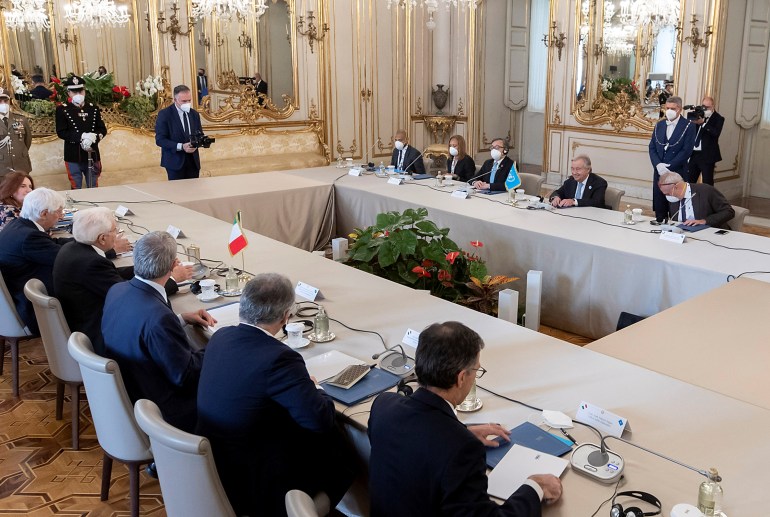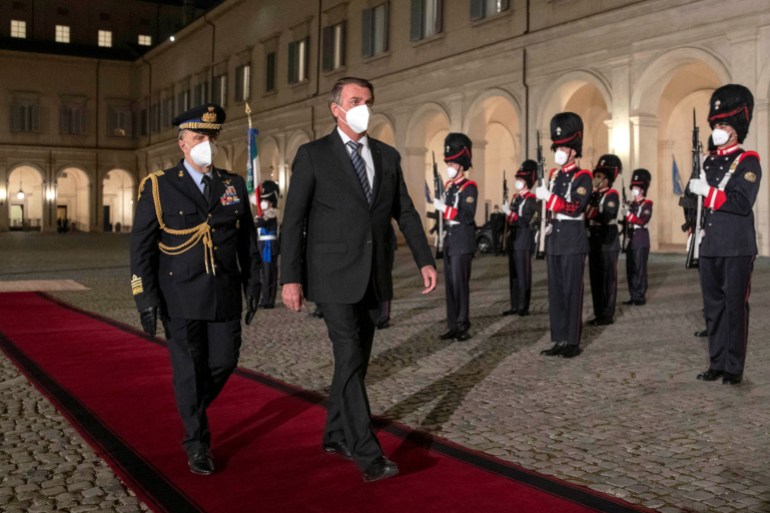G20: Will rich nations make progress on climate and vaccines?
Analysts say reaching consensus on pressing issues at the annual leader’s summit could prove elusive.

The climate crisis, vaccine equity, an energy crunch and global supply chain snarls will be in the spotlight as leaders from the world’s top 20 economies gather at the G20 summit in Rome, Italy this weekend. But reaching consensus on pressing issues could be elusive, analysts warn.
The meeting, the first in-person gathering of Group of 20 (G20) leaders since 2019, comes as the global economic recovery from the coronavirus pandemic faces a slew of challenges – from new strains of COVID-19 to supply shortages and inflation. It will also signal how close – or how far apart – major economies are on moving the needle on the climate crisis, with the United Nations Climate Change Conference (COP26) kicking off in Glasgow, Scotland on Sunday.
Keep reading
list of 4 itemsUS wages see record gains as employers woo scarce workers
What impact will the youth climate movement have on COP26?
Tedros Adhanom Ghebreyesus set to stay on as WHO chief
But with China’s President Xi Jinping and Russian President Vladimir Putin expected to drop in virtually on the G20 rather than in person, and the leaders of Japan, Mexico and Saudi Arabia also opting not to go to Rome, finding common ground on pressing issues could prove even tougher.
“G20 like any membership association is only as strong as its members want it to be,” said Matthew P Goodman, senior vice president for economics at the Center for Strategic and International Studies (CSIS). “You would think that COVID-19 would meet the test of a real crisis, but it is hard to get those group of countries to agree on anything.”
The climate finance gap
The G20 was created in the wake of the Asian financial crisis in the 1990s to give emerging economies a more prominent voice in global financial affairs. The annual leaders’ summit became a regular feature in 2008 – in response to the global financial crisis.
With a membership roster that accounts for more than 80 percent of world gross domestic product, 75 percent of global trade and 60 percent of the world’s population, the club is uniquely positioned to set priorities and marshall the resources to tackle them.
“The G20 obviously has macroeconomic issues as its traditional focus, but global health security and global warming are major impediments to prosperity,” Stewart M Patrick, the director of the International Institutions and Global Governance Program at the Council on Foreign Relations (CFR), told Al Jazeera.
A recent report showed that rich countries failed to meet their $100bn pledge of financing to help poorer nations in the fight against climate change. But any G20 agreement on climate is likely to set a positive tone for COP26 talks.
G20 leaders may promise to stop funding for coal-fired plants outside of their borders, but negotiations ahead of the summit are revealing differences over when to phase out coal use at home, Bloomberg News (paywall) reported, citing officials briefed on the talks.
Coal powers approximately 60 percent of China’s electricity, and roughly 70 percent of India’s, according to the International Energy Agency. Adding to that dependency in the near term is the current global energy crunch, which along with other supply chain bottlenecks is feeding inflation and presenting a headwind to economic recoveries.
Faced with blackouts, idled factories and the onset of winter, China has loosened regulations on domestic coal production.

“On climate, the outcome is likely to be more incremental than dramatic,” said CFR’s Patrick.
He added that United States President Joe Biden will surely push for green initiatives, but domestic politics could cast a shadow.
“Biden’s position is likely to be weak given uncertainty about whether Congress will pass enough green infrastructure and climate-related spending in the two huge bills it is considering,” said Patrick.
The jab divide
Addressing the growing gap in coronavirus vaccination rates between rich and poor countries is also exacerbating inequalities between nations.
On Friday, G20 health and finance ministers said they would take steps to make sure that 70 percent of the world’s population is vaccinated by the middle of next year – half a year sooner than their previous timeline, Reuters news agency reported.
The clock is ticking. Earlier this month, the International Monetary Fund warned of a “dangerous divergence” in recoveries between more mature economies and developing ones, with vaccine availability being a key driver.
Of the 1.3 billion doses rich countries promised to donate to poor nations under the World Health Organization’s COVID-19 Vaccines Global Access Facility (COVAX) programme, only 356 million have been provided.
Earlier this week, Amnesty International urged G20 countries to put aside “greed and selfishness” and ensure fair distribution of vaccines, noting that rich countries are sitting on some 500 million doses.
A key stumbling block is patent protections, which some nations would like to waive, arguing it gets more jabs into more arms.
Last October, India and South Africa submitted an appeal to the World Trade Organization on behalf of a group of countries urging the waiving of patent protections so those countries could produce generic versions of vaccines.

But the US, European Union, the United Kingdom and Japan have blocked efforts. In a shock move, Biden announced that the US – typically a staunch defender of intellectual property rights – would support lifting the patent protections for COVID-19 vaccines.
“The G20 remains divided over liberalising trade on vaccines and providing intellectual property waivers to allow more domestic production by developing countries,” said CFR’s Patrick.
The G20 is also divided on creating a global health board to help countries coordinate action. The US, European Union, Japan and UK back it while the BRICs nations, namely Brazil, Russia, India and China, do not, Patrick added.
Debt: ‘Statements of support as a matter of principle’
Another driver of growing divides between richer and poorer nations is debt.
The debt burden of the world’s low-income countries actually spiked 12 percent to a record $860bn in 2020 because of the pandemic, according to a recent report from the World Bank.

The G20 took action on debt via the Debt Service Suspension Initiative (DSSI), which went into effect May 1, 2020, benefitting 46 low-income countries with payment deferments. But the programme is set to expire at the end of 2021.
Earlier this week, the US called for quicker progress on restructuring the debts of highly indebted nations under the Common Framework for Debt Treatments and placed the blame on China’s “inability to make some decisions”.
“My guess is that the G20 will approve an extension of the DSSI,” Goodman of CSIS told Al Jazeera. “The Common Framework – which includes debt restructuring and forgiving debt – I think we will see statements of support as a matter of principle but it may be difficult to get countries to agree on moving forward on that.”
China has pushed back: Its development bank wants to be seen as a private creditor rather than part of the government. And Beijing is reluctant to join the Paris Club – a group of lender countries seeking a common approach toward debt restructuring, Goodman added.
“If one country forgives debt and one country does not, the payments favour the second country, obviously” he said, also stressing the need to also get the private sector on board. “If governments forgive debt but banks get paid back, it’s going to be a problem.”